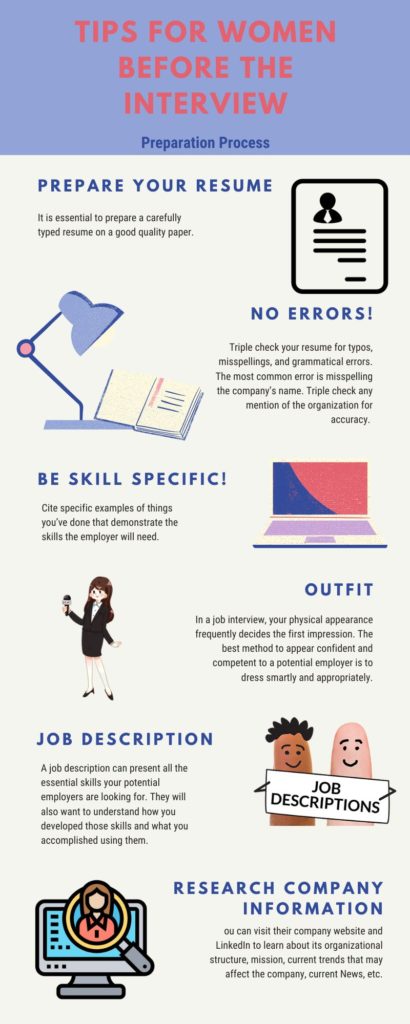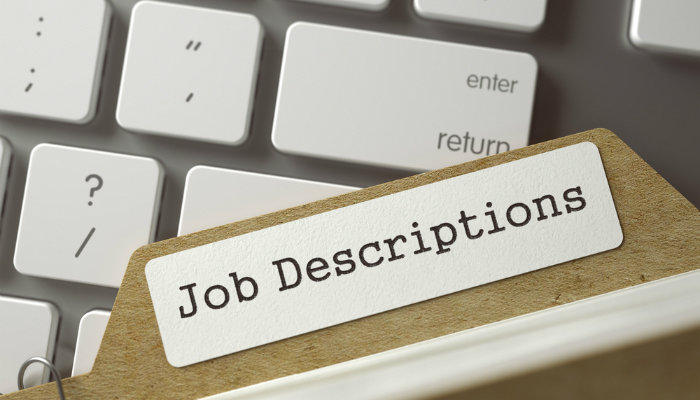Job interview tips for women that we will cover in this article will be helpful for women who are preparing for an interview. The job interview is your chance to showcase your skills, achievements, and abilities to a potential employer.
So, without further ado, just stick to the following tips, and you’ll be all set!
Tips for Women Before the Interview (Preparation Process)

Once you’ve landed the interview, preparation is essential. Although no two interviews are alike, they all follow a similar framework of introductions, questions and answers, and a closing dialogue:
Resume
Your resume plays a critical role in the interview. If it’s hard to read or looks sloppy, it might soon be scrapped! So it is essential to prepare a carefully typed resume on a good quality paper. Review our other articles about writing resume tips for women to confirm that you are using the right format.
No Errors!
Nothing can annoy an employer more than reading a resume with glaring errors. So it’s wise to triple check your resume for typos, misspellings, and grammatical errors. The most common error is misspelling the company’s name. Triple check any mention of the organization for accuracy.
We recommend having two to three other people proofread your resume.
Be Skill Specific!
You should emphasize experiences that your potential employer will be interested in and that are highlighted in the job description. Cite specific examples of things you’ve done that demonstrate the skills the employer will need. Also, point out any noteworthy achievements by using metrics. It adds trust to comments of previous success.
It’s important to remember that a CV is a profile, not a biography. You’ll have approximately a half minute to get your message across. The goal is to impress the company with your talents and abilities, demonstrating why they cannot function without you.
Outfit
In a job interview, your physical appearance frequently decides the first impression. The best method to appear confident and competent to a potential employer is to dress smartly and appropriately. Here are some outfit ideas for women’s job interviews:
Business Formal Look
For more businesses formal look, like banking, you should choose suits, pants, and blazers to add a structured image. This corporate style will enhance the intense business women’s look with sophistication.
- Black trousers, wide-legged and straight-leg trousers, are a good pick for dark colors.
- A white, crisp shirt with a classic collar or slip collar.
- Black belt and shoes.
- A good blazer that is black and tailored fit.
- Pencil skirt, skirt suits, matched-up blazer in structured style.
Business Casual Look
This business casual look will be great for less formal businesses like software companies and is both classy and a bit stylish. You can wear trousers, jeans, wide-legged pants, palazzo pants, flowy blouse tops, and blazers.
- It is okay to pick palazzo pants with natural to nude shade or elephant pants with plain fabric, paired with blouse tops and belts.
- Blazer has a structured feminine look that features natural hues or dark to soft shades.
- Flowy fabrics shirts with classic prints, stripes, polka, zigzag, or small floral impressions.
- Footwear in nude, black white, or navy, from wedges to pumps, is okay.
- Cardigans are a good choice for cold weather.
- Shirt tops, tunic tops, or blazers with jeans are fabulous.
Casual Fashion Look
- This look is only suitable in creative fields like ad agencies and multimedia departments. Opt for a lightweight blazer or jacket. A combination of wide-legged pants & tops with bright colored blazers is all right.
- A cardigan with a sheath dress and belt is okay. However, avoid getting too dressy for interviews.
- Keep clothing in natural to neutrals while you can add a little color to the footwear.
- Use scarves to style up your blouse & pencil skirt or shirts & trousers.
Job Description
The job description is the most underutilized tool for preparing for job interviews. As a job seeker, you’ll probably use it at the beginning phases of your search. However, once you’ve landed an interview, the job description will be forgotten because it’s no longer relevant.
In fact, the job description provides a wealth of insider information that might help you prepare for an interview. As a result, you may utilize it to help you prepare for a more successful and seamless interview.

A job description can present all the essential skills your potential employers are looking for. They will also want to understand how you developed those skills and what you accomplished using them.
After reading the job description, you should have a broader understanding of what this position requires, what the company values, how you stack up, etc. Furthermore, consider what the job description leaves out. Those will probably be the questions you want to ask during the upcoming interview.
Research Company Information
It’s essential to research the company you’re applying to before entering the interview. Employers may ask you what you know about the company. They will gauge how interested you are in the role based on your responses. If you don’t know anything about the company, they’ll lose confidence that the job is really the right fit. .
You can visit their company website and LinkedIn to learn about its organizational structure, mission, current trends that may affect the company, current News, etc.
You can also look for recent press releases or social media posts, giving you solid insights into your target company.
Tips for women during the interview
During the interview, you should make eye contact and articulate your answers. If this is hard for you, practicing with a family member or friend is best. Remember, practice will make perfect.
Timing
First impressions are crucial. So you will need to attend the interview on time to make a good impression on the employer. If you do not know exactly where you will be interviewing, it is best to find it a few days before the interview.
To guarantee that you get to the interview venue on time, you should plan your route ahead of time. Furthermore, if you intend to take public transportation, you should have a backup plan in case of delays or closures.
Instead of arriving at the interview place on time, you should arrive about 10 to 15 minutes early. That way, you will have a few minutes to observe the dynamics of the workplace.
Use the Body Language
Employers will value you more if you exude confidence in your body language. For example, when shaking hands with a man, begin with a firm handshake.
During the interview, you should stand or sit tall with your shoulders back. Before the interview, take a deep breath and exhale slowly to manage your feelings of anxiety and encourage your confidence.

How can you confidently use body language during the interview? Again, it is practice.
Sell Yourself
It is wise to answer salary-related questions vaguely so that you can negotiate later.
For example, when asked about your salary expectations, respond with “What is the current range of pay for others in this role?.” If you like what you hear, say the salary “sounds reasonable” and that you believe a fair compensation package can be negotiated.
If the offer is less than you expected, keep negotiating until you get what you deserve.
Tips for women after the interview
Once the interview is over, give yourself the best chance to move forward by doing the following:
Ask About The Next Steps
After the interview, you should ask your hiring manager, recruiter, or interviewer about what you should expect ahead. It may include an email with results from your consultation, additional inquiries, a reference list, or another interview.
Send a Thank-you Note
We recommend sending a separate thank you email to your hiring manager, recruiter, or interviewer after the interview.
If you are interviewing in the morning, send thank-you emails in the afternoon of the same day. If you’re interviewing in the afternoon, sending it in the next morning is okay.

